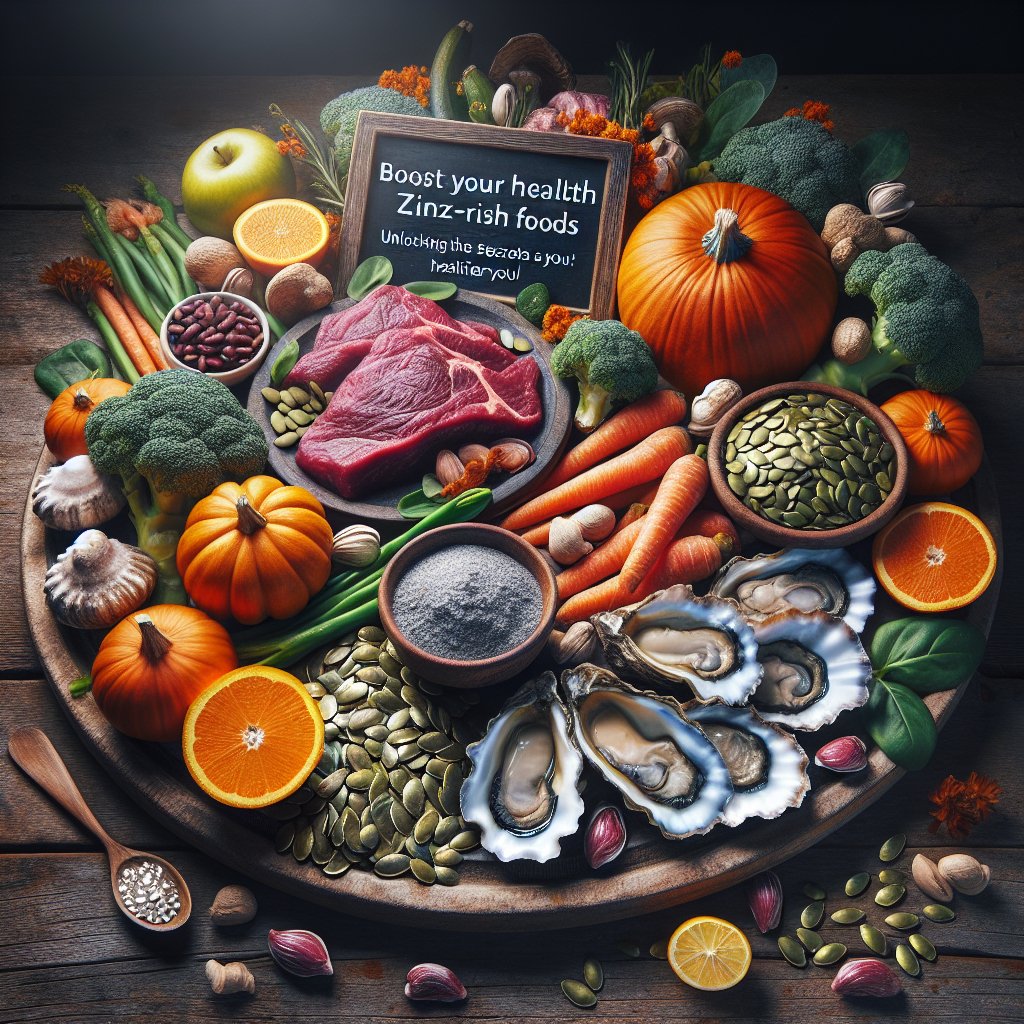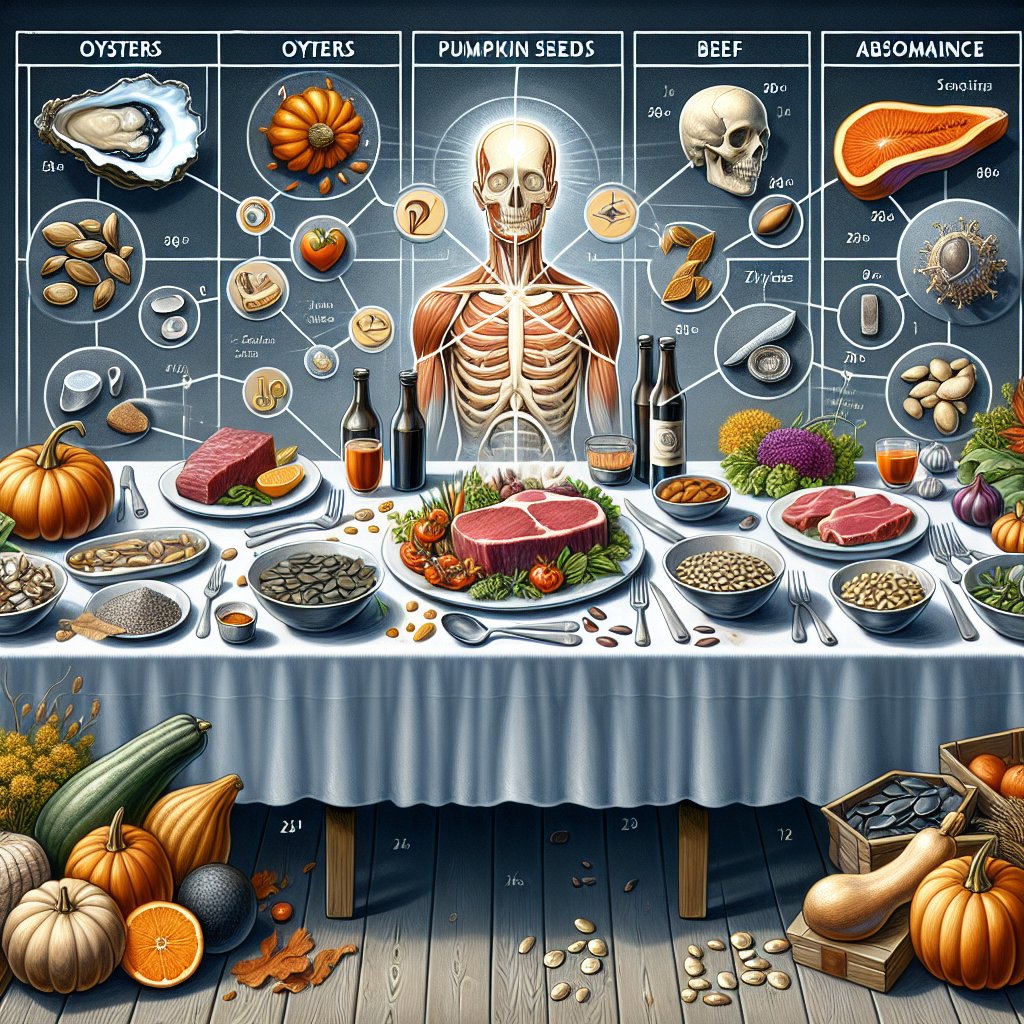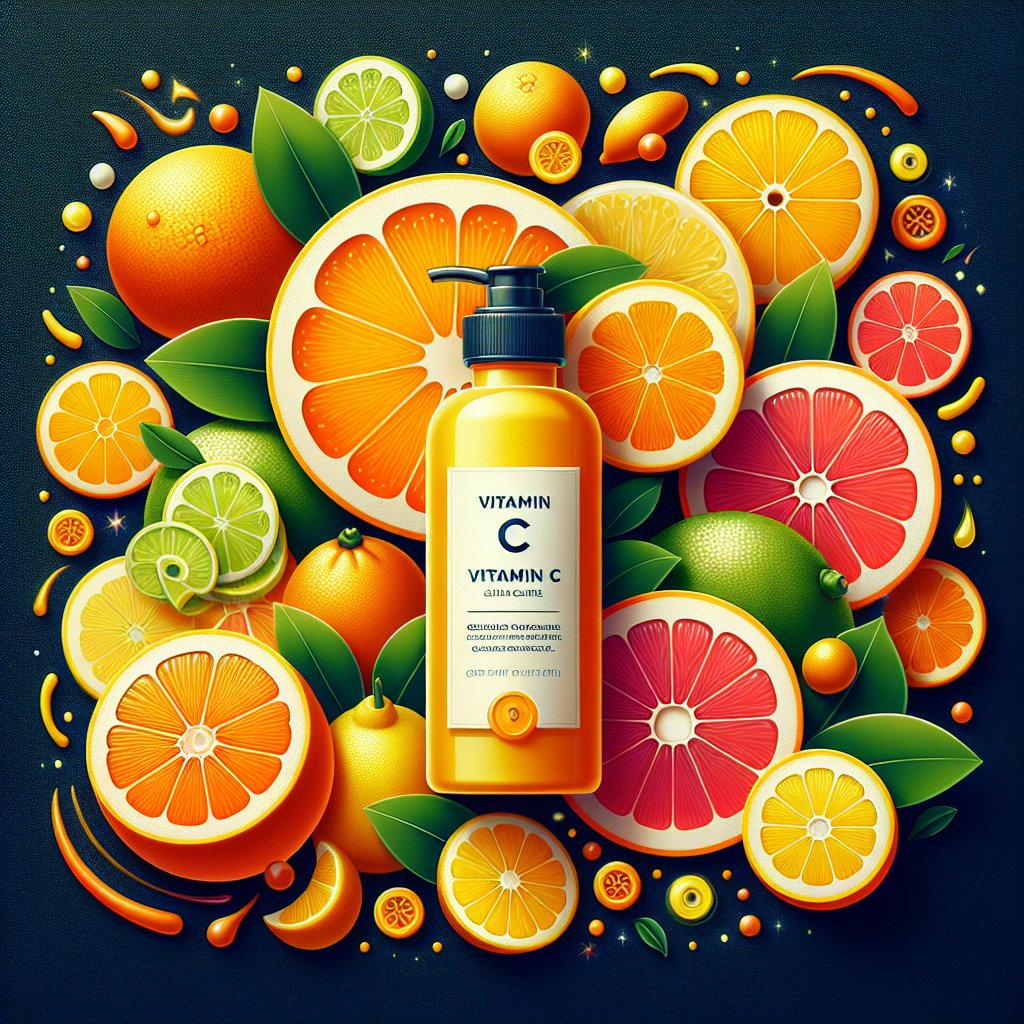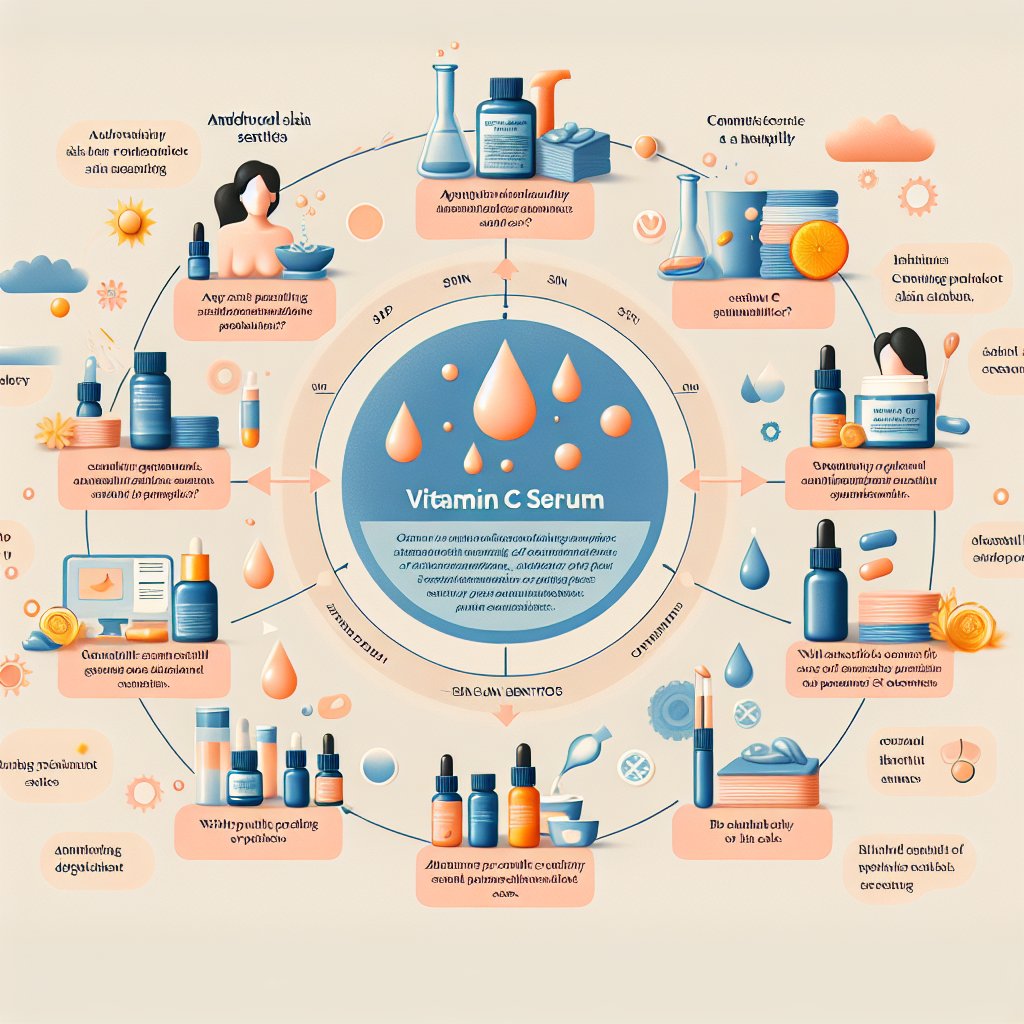Boost Your Health with Zinc-Rich Foods: Unlocking the Secrets to a Healthier You!
Unlocking the Power of Zinc-Rich Foods for a Healthier You!
Welcome, lovely readers! Today, we’re diving into the fascinating world of zinc-rich foods and their incredible impact on your health. From boosting your immune system to supporting overall well-being, zinc plays a crucial role in maintaining good health. So, grab a cup of tea, get comfy, and let’s explore the wonders of this essential mineral that can truly unlock the secrets to a healthier you!
The Importance of Zinc in Your Diet
Let’s talk about why zinc is such a big deal when it comes to your health. Zinc is an essential trace mineral, meaning that your body needs it in small amounts but it’s absolutely vital for various functions. As a powerful antioxidant, zinc helps combat oxidative stress and inflammation, which are at the root of many chronic diseases. It also supports the immune system, promotes wound healing, and assists in DNA synthesis. In fact, zinc is involved in over 300 enzymatic reactions in the body, so you can imagine just how crucial it is for your overall well-being.
Research has shown that maintaining adequate zinc levels in the body can contribute to a strong immune system, improved cognitive function, and even a better sense of taste and smell. This mighty mineral is also essential for cellular growth and division, making it especially important for children, teenagers, and pregnant women. So, it’s safe to say that zinc is a true health hero!
Zinc-Rich Foods to the Rescue
Now that we’ve established the importance of zinc, let’s take a peek at some delicious sources of this essential mineral. The good news is that there’s a wide variety of foods that are naturally rich in zinc, making it easy to incorporate into your diet.
Seeds like pumpkin seeds and hemp seeds are not only crunchy and delicious but also packed with zinc. Nuts, particularly cashews and almonds, are also great zinc-rich options for snacking. If you’re a seafood lover, oysters, crab, and lobster are fantastic sources of zinc. For the plant-based eaters, legumes such as chickpeas, lentils, and beans are excellent choices to boost your zinc intake. Additionally, dairy products like cheese and yogurt, as well as whole grains like quinoa and oats, can also provide a good amount of zinc.
It’s important to note that the bioavailability of zinc from plant-based sources may be lower due to the presence of phytates, which can inhibit its absorption. To maximize zinc absorption from plant foods, you can soak, sprout, ferment, or roast them before consumption. Incorporating vitamin C-rich foods alongside zinc-rich foods can also enhance zinc absorption, so think of pairing your favorite zinc sources with a side of colorful fruits and vegetables.
With these tasty options, there’s something for everyone to enjoy while reaping the benefits of this incredible mineral.
Stay tuned for the next part of our journey where we dig deeper into the role of zinc in supporting your immune system and overall well-being. Until then, happy zinc-rich eating!

Zinc-Rich Foods
When it comes to maintaining a healthy diet, it’s important to ensure that you’re getting all the essential nutrients your body needs. One such essential mineral is zinc, which plays a crucial role in various bodily functions, including immune system support, wound healing, and DNA synthesis. If you’re looking to boost your zinc intake, here are some delicious foods that are excellent sources of this vital nutrient.
Oysters
Oysters are often hailed as one of the top sources of zinc, and for good reason. These delectable mollusks are not only a delectable indulgence but also a powerhouse of essential nutrients. Just a 3-ounce serving of cooked oysters can provide up to 74 milligrams of zinc, which is more than six times the recommended dietary allowance for adult women. Incorporating oysters into your diet can be a luxurious way to ensure you’re meeting your daily zinc requirements.
Beef
If you’re a fan of meat, then good news – beef is a fantastic source of zinc. In fact, a 3-ounce serving of beef can contain around 7 milligrams of zinc, making it a substantial contributor to your daily intake. Whether it’s a juicy steak, lean ground beef, or tender beef ribs, there are plenty of delicious ways to include this zinc-rich food into your meals.
Pumpkin Seeds
For those who prefer plant-based sources of zinc, pumpkin seeds are a fantastic option. These crunchy seeds are not only a convenient snack but also a nutrient-dense superfood. Just a one-ounce serving of pumpkin seeds can provide nearly 2 milligrams of zinc, making them a convenient and tasty way to boost your daily zinc intake. Sprinkle them over salads, yogurt, or enjoy them on their own for a satisfying and nutritious snack.
Ensuring that your diet incorporates a variety of zinc-rich foods, whether from animal or plant sources, can help you meet your daily requirements for this essential mineral. Experimenting with different recipes and meal ideas that incorporate these foods can make the process of increasing your zinc intake an enjoyable and delicious one!
Benefits of Zinc
When it comes to boosting your health, zinc-rich foods are an absolute game-changer. Zinc is an essential mineral that plays a crucial role in various bodily functions and processes. Let’s dive into the amazing health benefits of consuming zinc-rich foods, including immune system support and wound healing.
Immune System Support
Zinc is known for its remarkable ability to support the immune system. Research has shown that adequate zinc levels can help the body fight off infections and illnesses more effectively. By consuming foods rich in zinc, you can give your immune system the extra support it needs to keep you healthy and vibrant.
A study published in the Journal of the American College of Nutrition found that zinc plays a pivotal role in the development and function of immune cells. It helps regulate the immune response, ensuring that your body can mount a strong defense against pathogens. This means that incorporating zinc-rich foods into your diet can be a proactive way to fortify your immune system and reduce the risk of falling ill.
Wound Healing
In addition to its immune-boosting properties, zinc is also crucial for wound healing. Whether you have a minor cut or a more significant injury, ensuring that your body has an adequate supply of zinc is essential for the healing process.
Research published in the Journal of Wound Care highlights the role of zinc in promoting wound healing. It aids in the production of new skin cells, supports collagen synthesis, and has antioxidant properties that protect against further tissue damage. By including zinc-rich foods in your diet, you can potentially speed up the recovery of wounds and maintain the health of your skin.
Now, let’s explore some delicious and nutritious foods that are packed with this incredible mineral.
Boost Your Health with Zinc-Rich Foods: Unlocking the Secrets to a Healthier You!
Zinc Deficiency: Unraveling the Impact on Your Health
Hi there, health enthusiasts! Today, we’re going to dive deep into the world of zinc and why it’s a powerhouse mineral that your body needs. But first, let’s talk about what can happen when you don’t get enough of it.
Highlighting the Symptoms of Zinc Deficiency
Zinc plays a crucial role in various bodily functions, from supporting a healthy immune system to aiding in proper growth and development. When you’re lacking in this essential mineral, several symptoms can manifest:
1. Impaired Growth: Studies have shown that zinc deficiency in children can lead to stunted growth and delayed sexual maturation. So if you’re a parent, ensuring that your little ones get enough zinc is vital for their healthy development.
2. Weakened Immune Function: Your immune system relies on zinc to function optimally. Without an adequate amount of zinc, you may be more susceptible to infections and illnesses, and your body’s ability to heal from wounds could be compromised.
These symptoms are crucial indicators that your body needs more zinc, and paying attention to them can be a game-changer for your overall well-being.
Consequences of Zinc Deficiency
While the symptoms of zinc deficiency are concerning on their own, the consequences can be even more alarming. Scientific research has linked zinc deficiency to an increased risk of:
1. Impaired Cognitive Function: Low levels of zinc have been associated with cognitive deficits, particularly in children and the elderly. Ensuring an adequate intake of zinc could support optimal brain function.
2. Delayed Wound Healing: Zinc is involved in various aspects of the wound-healing process, including inflammation, immune function, and tissue repair. Without enough zinc, the body’s ability to heal wounds efficiently may be compromised.
Now that we’ve unraveled the impact of zinc deficiency on your health, it’s time to explore how you can ensure that you’re getting enough of this essential mineral through your diet.
This section covers the symptoms and consequences of zinc deficiency, highlighting the importance of this essential mineral for growth, immune function, cognitive health, and wound healing. It emphasizes the significance of recognizing the symptoms and understanding the potential consequences of not addressing a zinc deficiency. The content is optimized for the keyword “foods with zinc” by orienting readers toward dietary solutions to prevent or address zinc deficiency.
Recommended Daily Intake of Zinc
Welcome back, lovely readers! Today, we’re diving deep into the world of zinc-rich foods and the incredible health benefits they offer. Before we explore the amazing array of zinc-packed edibles, let’s shine a light on the recommended daily intake of this essential mineral for different age groups and demographics. So, let’s unlock the secrets to a healthier you by understanding the power of zinc!
Why Zinc is Vital for Your Health
First things first. Why is zinc so important for your overall health and well-being? This mighty mineral plays a crucial role in numerous biological processes, including immune function, protein synthesis, wound healing, DNA synthesis, and cell division. It’s also a key player in supporting normal growth and development during pregnancy, childhood, and adolescence. With such a long list of vital functions, it’s no wonder why adequate zinc intake is essential for people of all ages.
Zinc Recommended Daily Intake
The Recommended Dietary Allowance (RDA) for zinc varies by age and sex. According to the National Institutes of Health, the following are the recommended daily intakes for different demographics:
- Infants (0-6 months): 2 mg
- Infants (7-12 months): 3 mg
- Children (1-3 years): 3 mg
- Children (4-8 years): 5 mg
- Children (9-13 years): 8 mg
- Adolescents (14-18 years): 11 mg for males and 9 mg for females
- Adults (19+ years): 11 mg for males and 8 mg for females
It’s interesting to note that the recommended daily intake for males is higher than that for females, particularly during adolescence and adulthood. This is because zinc plays a critical role in the development of the male reproductive system, necessitating a slightly higher intake for males.
Special Considerations for Pregnant and Breastfeeding Women
For pregnant and breastfeeding women, adequate zinc intake is crucial not only for their own health but also for the optimal growth and development of their babies. The recommended daily intake of zinc for pregnant women is 11 mg, while breastfeeding women require 12 mg per day. Ensuring these higher levels of zinc intake can contribute to the healthy development of the fetus and infant.
Impacts of Zinc Deficiency
Now, let’s talk about the potential consequences of not getting enough zinc. When the body lacks sufficient zinc, it can lead to a weakened immune system, delayed wound healing, decreased sense of taste and smell, hair loss, and skin sores. Furthermore, children with a zinc deficiency may experience growth retardation and delayed sexual maturation. Therefore, it’s crucial to incorporate zinc-rich foods into the diet to prevent these adverse effects.
Zinc-Rich Foods to the Rescue
So, where can you find these wonderful zinc-packed foods? Look no further than a variety of delicious options like oysters, beef, crab, lobster, pork, and chicken, as well as legumes, nuts, seeds, and dairy products. For those following a plant-based diet, incorporating zinc-rich plant foods such as chickpeas, lentils, hemp seeds, pumpkin seeds, and cashews can help meet their daily zinc needs.
Adequate zinc intake is achievable through a well-balanced diet that includes a variety of these nutrient-dense foods. However, for individuals who may have difficulty meeting their zinc needs through diet alone, zinc supplements are also available. As always, it’s essential to consult with a healthcare professional before adding any new supplements to your daily regimen.
Wrap Up
Now that we understand the recommended daily intake of zinc for different age groups and demographics, as well as the potential consequences of a deficiency, it’s clear that incorporating zinc-rich foods into our diets is a wise and delicious choice. Whether you prefer a juicy steak or a hearty bowl of lentil soup, there are countless ways to ensure that you are meeting your daily zinc needs. Let’s toast to our health with a sprinkle of pumpkin seeds on our salads, a handful of cashews for a snack, or a flavorful seafood dinner. It’s time to unlock the secrets to a healthier you with the power of zinc!
Boost Your Health with Zinc-Rich Foods: Unlocking the Secrets to a Healthier You!
Zinc Absorption Factors
Hey there, fellow keto enthusiasts! Today, let’s dive into the wonderful world of zinc and learn how to maximize its benefits for our health. Zinc is a vital mineral that plays a crucial role in various bodily functions, including immune support, wound healing, and metabolism regulation. However, the absorption of zinc in the body can be influenced by several factors. Let’s explore how phytates and other minerals can impact the absorption of this essential nutrient.
Phytates and Zinc Absorption
Phytates are naturally occurring compounds found in plant-based foods such as grains, legumes, nuts, and seeds. While these foods are often touted for their health benefits, phytates can also bind to zinc, reducing its absorption in the body. The good news is that following a ketogenic diet naturally limits the consumption of phytate-rich foods, as the focus is primarily on low-carb, non-starchy vegetables and healthy fats. By prioritizing keto-friendly zinc sources, you can optimize the absorption of this important nutrient.
Other Minerals and Zinc Absorption
In addition to phytates, the absorption of zinc can also be influenced by other minerals, particularly iron and calcium. High levels of these minerals can compete with zinc for absorption in the intestines. However, maintaining a well-balanced keto diet that includes a variety of nutrient-dense foods can help mitigate this competition. For instance, incorporating zinc-rich animal products like beef, chicken, and seafood can ensure a good supply of this essential mineral without overwhelming interference from other minerals.
By being mindful of these absorption factors, you can make informed choices when selecting your zinc-rich foods on a keto diet. Embracing a diverse range of low-carb, whole food sources can help optimize the absorption of zinc and support your overall well-being.
Now that we’ve unraveled the mysteries behind the absorption of zinc, it’s time to explore some tantalizing keto-friendly foods that are packed with this essential mineral. So, stay tuned for the next section as we uncover delicious options to boost your zinc intake and enhance your health journey!

Cooking Tips for Retaining Zinc
When it comes to cooking foods rich in zinc, it’s essential to know that this vital mineral can be sensitive to heat and certain cooking methods. Zinc plays a crucial role in supporting the immune system, promoting wound healing, and contributing to the synthesis of DNA. Therefore, retaining the zinc content in your meals can maximize the nutritional benefits. Here are some cooking tips to help you preserve the zinc content in your foods.
1. Opt for Gentle Cooking Methods
When it comes to zinc-rich foods such as meat, poultry, and fish, choosing gentle cooking methods like steaming and gentle sautéing can help retain the zinc content. According to scientific research published in the International Journal of Food Sciences and Nutrition, these methods minimize the loss of zinc during the cooking process, ensuring that your meals remain rich in this essential mineral.
2. Embrace the Use of Herbs and Spices
Enhancing the flavor of your zinc-containing meals using herbs and spices not only adds deliciousness but also contributes to zinc retention. Research has shown that certain herbs and spices, such as turmeric and fenugreek, can help preserve the zinc content in dishes when used during cooking. Sprinkling these flavorful additions into your recipes is a simple way to boost the nutritional value of your meals.
3. Avoid Prolonged Cooking Times
Long cooking times at high heat can lead to a significant loss of zinc in foods. For instance, boiling foods for extended periods may cause the minerals to leach into the cooking water. To minimize this loss, it’s advisable to cook zinc-rich foods for shorter durations. Opt for methods like quick stir-frying or lightly steaming vegetables to help maintain their zinc content.
By paying attention to the cooking methods and techniques you use, you can ensure that the zinc content in your meals remains as intact as possible, thus reaping the maximum nutritional benefits from your food.
Exploring the Use of Zinc Supplements
While it’s incredibly important to obtain essential vitamins and minerals from the foods we eat, it’s not always easy to achieve the recommended daily requirements. This is where supplements can play a pivotal role in supporting our health. When it comes to zinc, some individuals may find it challenging to consume enough zinc-rich foods daily. As a result, exploring the use of zinc supplements as an alternative for meeting daily zinc requirements can be incredibly beneficial.
Scientific research has shown that zinc supplements can be effective in addressing deficiencies and supporting overall health. According to the National Institutes of Health, dietary supplements containing zinc are beneficial for individuals who may have low levels of zinc or have difficulty absorbing it from their diet. Zinc supplements can aid in immune function, wound healing, DNA synthesis, and even support normal growth and development.
When choosing a zinc supplement, it’s essential to opt for a high-quality product from a reputable source. Look for zinc supplements that contain zinc citrate, zinc gluconate, or zinc picolinate, as these forms are known for their high bioavailability, meaning the body can easily absorb and utilize the zinc effectively.
However, it’s crucial to note that while supplements can be incredibly useful, they should not serve as a replacement for a balanced and nutritious diet. It’s always best to strive for a diverse and zinc-rich diet, incorporating a variety of whole foods that naturally contain this essential mineral.
By including a combination of zinc-rich foods and, if necessary, high-quality zinc supplements, individuals can ensure they meet their daily zinc requirements, supporting overall health and well-being.
Boost Your Health with Zinc-Rich Foods: Unlocking the Secrets to a Healthier You!
Zinc and Health Conditions
Let’s delve into the fascinating world of how zinc intake can impact certain health conditions. Zinc is not only crucial for overall health and well-being but also plays a significant role in combating common colds and managing acne.
Zinc and the Common Cold
Picture this: it’s a beautiful winter morning, but suddenly, you start feeling under the weather. Sniffles, sneezes, and a scratchy throat – the common cold has caught up with you. However, did you know that zinc could be your secret weapon against this common nuisance?
A meta-analysis published in the Open Respiratory Medicine Journal revealed that zinc supplementation can effectively reduce the duration and severity of the common cold. The study suggested that adequate zinc levels in the body play a pivotal role in supporting the immune system, thus assisting in the management of cold symptoms. By incorporating zinc-rich foods into your diet, you may fortify your body’s defense against the common cold.
Zinc and Acne
Acne, the bane of many people’s existence, can be quite a pesky skin condition to deal with. However, zinc might just be the missing piece in your quest for clearer skin. Research published in the Dermatology Research and Practice journal indicated that zinc has anti-inflammatory and anti-microbial properties, making it a promising element in the management of acne.
Furthermore, the study suggested that individuals with acne tend to have lower levels of zinc in their blood. By incorporating zinc-rich foods like pumpkin seeds, chickpeas, and spinach into your diet, you may help support healthy levels of zinc in your body, potentially aiding in the management of acne.
Remember, while zinc can be beneficial for managing health conditions like the common cold and acne, it’s essential to maintain a balanced diet and consult with a healthcare professional for personalized guidance.
Incorporating zinc-rich foods in your diet may elevate your overall well-being. So, why not give it a try and unlock the potential benefits of this essential micronutrient?
Conclusion: Embracing Zinc-Rich Foods for Optimal Health and Well-Being
As we’ve delved into the wonderful world of zinc-rich foods, it’s evident that these nutritional powerhouses play a crucial role in supporting our overall health and well-being. From immune function and wound healing to metabolism and cognitive function, zinc is an essential micronutrient that should not be overlooked. By incorporating zinc-rich foods into our daily diet, we can unlock the secrets to a healthier version of ourselves. The benefits are simply too good to ignore!
Research has consistently highlighted the significance of zinc in our diet. According to the National Institutes of Health, zinc is involved in over 100 enzymatic reactions in the body, contributing to processes such as protein synthesis, DNA synthesis, and immune function. This mineral acts as a catalyst for countless biological processes, making it a cornerstone of our overall health.
The Immune-Boosting Magic of Zinc
Let’s start with the immune system. Zinc is known for its pivotal role in supporting immune function. Studies have shown that zinc deficiency can impair immune responses, making individuals more susceptible to infections and diseases. Conversely, incorporating zinc-rich foods can help fortify our immune defenses, keeping common colds and other ailments at bay.
Revving Up Metabolism and Energy Levels
When it comes to metabolism, zinc pulls its weight. Research has indicated that this mineral is involved in the synthesis, storage, and release of insulin, ultimately impacting our metabolic rate. By including zinc-rich foods in our diet, we can potentially support healthy insulin levels and keep our energy levels stable throughout the day.
The Brain-Boosting Benefits
Let’s not forget about the brain. Zinc is a vital player in cognitive function and neurological health. It has been found to be involved in the regulation of neurotransmitters and the maintenance of brain structure. Additionally, studies have suggested a link between zinc intake and improved memory and learning. The brain-boosting benefits of zinc-rich foods are simply too good to pass up!
Embracing Zinc-Rich Foods for a Healthier You
When it comes to incorporating zinc-rich foods into our diet, there is a myriad of delicious and nutritious options to explore. From pumpkin seeds and chickpeas to cashews and lean cuts of beef, the variety is truly exciting. By embracing these zinc-rich foods, we can make significant strides toward optimizing our health and well-being.
So, let’s raise our awareness about the significance of zinc in our diet and make conscious efforts to include these incredible foods in our meals. The path to a healthier and happier version of ourselves starts with the simple yet powerful act of embracing zinc-rich foods.
Here’s to unlocking the secrets to a healthier you through the amazing benefits of zinc-rich foods!


